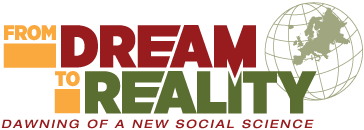News & Announcements
- Details
- Written by Joshua Wachtel
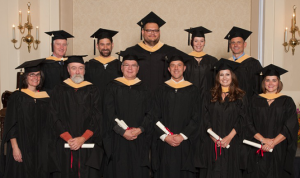 The IIRP Graduate School Class of 2015 is finding inspired new ways to take their passion for restorative practices out into the world, employing explicit elements of the practices to develop new ideas in their fields, workplaces and communities.
The IIRP Graduate School Class of 2015 is finding inspired new ways to take their passion for restorative practices out into the world, employing explicit elements of the practices to develop new ideas in their fields, workplaces and communities.
Their capstone projects, which they presented in a final paper and oral presentation, explored:
- Details
- Written by Joshua Wachtel
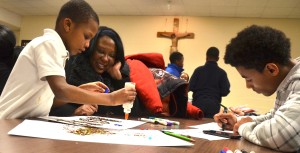 Parent/child "Virtue Night"
Parent/child "Virtue Night"
As director of school climate in the Archdiocese of St. Louis, Lynne Lang is committed to blending restorative work with the mission of the church.
“The Old Testament reveals in the creation story that God never intended for us to be alone. We are wired to live in community,” says Lang. “What better way to live that message than by working on continuous improvement in the quality of those relationships at every level in our lives?”
- Details
- Written by Joshua Wachtel
The following are highlights gleaned from the past two months. For a more comprehensive news feed, please follow @iirpgradschool on twitter. (You need not join twitter in order to read our daily posts.)
- Details
- Written by Joshua Wachtel
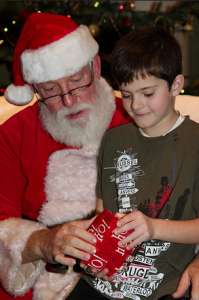 U.S. Army Corps of Engineers photo by Carol E. Davis, Flickr Creative Commons
U.S. Army Corps of Engineers photo by Carol E. Davis, Flickr Creative Commons
Last year, during a shared bus ride, two teens from a Buxmont Academy school upset a group of first- and second-grade Catholic school students by telling them there was no Santa Claus.
Since Buxmont is an IIRP model program that employs restorative practices, when the principal of the Catholic school called to report the event, Buxmont staff suggested a circle to hold the teens accountable and give them the chance to apologize.
Buxmont counselor Jean Scott took the two boys who made the offending comments to the Catholic school to conduct the circle, along with two other youth to serve as friends and emotional support for the boys. They met with the principal first.
- Details
- Written by Joshua Wachtel
 Listen to the second episode of Restorative Conversations, a new podcast by the Community of Restorative Researchers (CoRR).
Listen to the second episode of Restorative Conversations, a new podcast by the Community of Restorative Researchers (CoRR).
Ian Marder, founder of CoRR, interviews Andrew Hancock, Restorative Justice Coordinator for Darlington, UK (North East England), and Stephen Twist, a barrister and restorative practitioner in Darlington. They talk about the growth of restorative justice in Darlington in recent years, the development of the Darlington Restorative Justice Hub (formerly Darlington Neighbourhood Resolution), the recruitment, training and supervision of volunteer facilitators and the differences between practicing law and practicing restorative justice.
- Details
- Written by IIRP
- Details
- Written by IIRP Staff
Breakout Sessions
- Violence- and Trauma-Informed Prevention Micro-Mapped within the Social Discipline Window — Art Fisher, Nancy MacDonald (powerpoint)
- Change the conversation, Change the Culture — Peter Block (video)
- Preparing Future Educators to Implement Restorative Practices in K-12 Classrooms: The Challenges and Possibilities — David Fletcher (powerpoint)
- Taking A Restorative Approach to Expel Disparities in School Discipline — Keith Hickman (powerpoint, article, paper 1, paper 2)
- The Power of Restorative Practices PLUS a Social Emotional Skill-building Program: One School District’s Story — Bridgid Normand, Karen Sorensen (powerpoint, handout 1, handout 2, handout 3, handout 4)
- Transforming School Culture in an Asian Context through Restorative Practices: A Singapore Perspective — Lin Lynn Koh, Yan Hui Tan (powerpoint 1, powerpoint 2, powerpoint 3)
- Racism Stops with Me: How White Folks Can Use Healing Circles to End Racism — Mika Dashman (handout)
- Using Restorative Principles to Build a Community Conversation — Susan A Cherry (powerpoint)
- Refugee and Immigration Circle Conversation — Vidia Negrea (statement)
- Introduction to Motivational Interviewing and Stages of Change — Elizabeth Smull, Sarah Santin (powerpoint, handout)
- An Open Conversation: Challenges Facing Restorative Practitioners Embedded in Highly Adversarial Criminal Justice Domains— John Cutro, Terry O’Connell, Constance M. Ives-Fenton (handout 1, handout 2)
- Using Circles to Support Instruction in a Predominantly Male, Diverse Population— Suzanne McMurtray, Christina Krabitz (handout 1, handout 2, handout 3)
- Restorative Play Works: Reap the Restorative Benefits of Play and More — Barbara Kickbush, Sherry Burdick (powerpoint, handout 1, handout 2)
- The Best Is Yet To Come: Unlocking Restorative Practices’ True Potential — Terry O’Connell (powerpoint)
- Barking Up the Right Tree: Using Restorative Justice to Shift the Paradigm of Animal Abuse — Debra Vey Vonda-Hamilton (handout)
- Special Needs and Restorative Practices — Margaret Thorsborne (powerpoint)
- Giving Peace a Chance: Implementing Middle School Restorative Conferences Using Students as Facilitators — Jennifer L. Williams (handout 1, handout 2, handout 3, handout 4)
- Kiss Your Assets: One Way to Build a Restorative Hub — Rick Kelly, Amy Taylor, Sewsen Igbu (handout 1, handout 2, handout 3)
- Head and Heart: Scaling up the Restorative Paradigm Shift in School Systems, Large and Small — Nancy Riestenberg (paper- This article was originally published in the Restorative Practices in Action Journal: for Schools and Justice Practitioners, 2015, New York State Permanent Judicial Commission on Justice form Children.)
- Enhancing Supports to Reduce School-Based Arrests — Tecenia Casiano, Jeana Bracey, Tianna Hill (powerpoint, handout 1, handout 2)
- Intercultural Competence and the Social Discipline Window — Lynne Lang (powerpoint - in PDF format)
- The Criminal Justice Matrix: The Baby from the Bathwater — Cynthia Pong, Shailly Agnihotri (powerpoint, article)
- Community Juvenile Justice that Works: Shifting the Paradigm from Punitive to Restorative — Yejide Ankobia
- Enhancing Application of Restorative Practices: Best Practices, Practice Wisdom and Peer Supervision — David Deal (powerpoint)
- Leading in a Restorative Community — Margaret Thorsborne (powerpoint)
- Embedding Restorative Practices and Circles into Teacher Education: A Missing Piece of the Puzzle — Trista Hollweck, Kristin Reimer (powerpoint, handout)
- Sustainability of Whole-School Change Through Restorative Practices: An Independent Action Research Study — Maureen Calvo (powerpoint, paper)
- Achieving Safer Schools from the Inside Out: A Youth Empowerment Strategy — Rick Phillips (powerpoint, handout)
- Virtue-Based Restorative Discipline: Responding from the Inside Out to Bullying Behaviors — Lynne Lang (powerpoint - in PDF format)
- Can Restorative Practices Help Bring About Democracy 2.0? — Joshua Wachtel (paper)
- Changing the Conversation: Tools for Talking When the Stakes are High — Sharon Mast (powerpoint, handout)
- Shame and Shaming: How We Hurt Others and Ourselves When Shame is Unresolved — Jane R Pennington (powerpoint, handout 1, handout 2, handout 3)
- Peer-to-Peer Prevention Program: Partnership of Evidenced-based Bystander Education and AOD Prevention Strategies — Rick Phillips (powerpoint, handout)
- The Relevance of Restorative Practices to Implementation of the Convention of the Rights of the Child — Hazel Thompson-Ahye, Krystle Ahye (powerpoint 1, powerpoint 2)
- Unleashing the Unique Influence of Young Restorative Practices — Wendy S. Lesko (powerpoint)
- Blending PBIS and the Restorative Approach in a Large Urban District — Kim DeGeorge, Kristina C. Jackson (powerpoint)
- Details
- Written by Joshua Wachtel
John W. Bailie, Ph.D., Inauguration Speech as Second President
of the International Institute for Restorative Practices (IIRP) Graduate School,
October 23, 2015, Bethlehem, Pennsylvania
Introduction
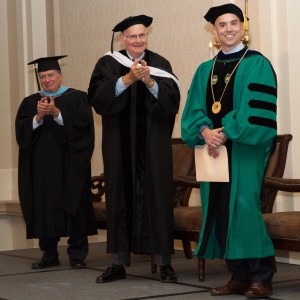 (r-l) Dr. John Bailie, 2nd IIRP President, William Ballantine, IIRP Board of Trustees Chair, and IIRP Founder Ted Wachtel.
(r-l) Dr. John Bailie, 2nd IIRP President, William Ballantine, IIRP Board of Trustees Chair, and IIRP Founder Ted Wachtel.
Many years ago, speaking as one of the first graduates of the IIRP graduate program, I stated that every generation of humanity faces a few clear and undeniable challenges. One central challenge for this generation is a crisis of community and relationships. More than any other time in history, we will live, communicate and relate to an incredible diversity of people. Global physical mobility, as well as social unrest and international conflict, make this a certainty for many decades to come. These realities challenge old social formations, ideas and norms.
- Details
- Written by Joshua Wachtel
 Listen to the first episode of Restorative Conversations, a new podcast by the Community of Restorative Researchers (CoRR).
Listen to the first episode of Restorative Conversations, a new podcast by the Community of Restorative Researchers (CoRR).
Ian Marder, founder of CoRR, interviews Dr. John Bailie and Ted Wachtel, the current and former presidents of the International Institute for Restorative Practices Graduate School during their recent visit to Kortrik, Belgium.
Topics covered during the discussion include Bailie and Wachtel's backgrounds, the work of the IIRP in training and implementing restorative practice in schools, universities and criminal justice, and the future of restorative practice as a social movement and a new social science.
- Details
- Written by Joshua Wachtel
As the number of stories about restorative practices in the news grows daily, we are limiting the number of items in this roundup, featuring the most significant highlights, in order to make it more accessible.
For a more comprehensive news feed, please follow @iirpgradschool on twitter, and note that you do not need to join twitter in order to read our daily posts there.

Restorative Works Year in Review 2024 (PDF)
All our donors are acknowledged annually in Restorative Works.

